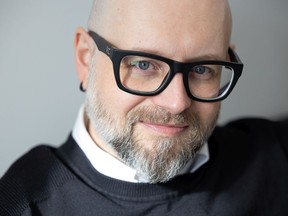"I just hope they have an escape — just like any reading should help you do — into other universes."

Reviews and recommendations are unbiased and products are independently selected. Postmedia may earn an affiliate commission from purchases made through links on this page.
The short stories in Craig Silliphant’s first book of fiction, Nothing You Do Matters, reflect his love for pop culture and the Prairies.
He said his experience as a writer and journalist in the arts community aided his work on the stories.
Silliphant chatted with the StarPhoenix about this first work of fiction.
Q: What made you decide to delve into fiction?
A: I grew up in a reading household. I read from a pretty young age and I used to write a lot of fiction.
I found myself working in media as a professional writer, but I was so busy with journalism and film projects and advertising and marketing that I didn’t have time for writing fiction anymore.
As I grew in my career and had a family, I decided to prioritize getting back into writing fiction. I started writing short stories, and I ended up with a good chunk of stories that I liked, and some beta readers I gave them to also liked. So, I was like, “Hey, I think I can do this.”

Q: Do you have a favourite story in this collection?
A: I probably have two. There’s the very first story in the book, Across a Crowded Mall. It was the idea that there’s people you went to high school with that there were crazy rumours about, and they may not have even known those rumours at the time. And 20 to 30 years later, you still remember those rumours.
And then the title story is called Nothing You Do Matters. It’s the idea that God is watching this crime that’s about to unfold and telling the audience directly why he doesn’t bother to stop it.
There is a vague theme that runs through the book, what I’d call nihilistic optimism — that idea that we’re just parasites clinging to this rock that’s hurtling through space and we exist for a blink of an eye, so nothing we do really matters.
That can be a terrifying idea to some people, but to me — and hopefully through the book — it’s a freeing idea. It means you don’t have to worry about all these little things. It’s a free pass to discover yourself and your place in the universe.
Q: What is your favourite thing about living on the Prairie and how do these stories reflect Prairie life?
A: I love Saskatoon. I like the idea — I especially saw this covering the music scene — where everybody supports each other here.
And I love that it has a bit of a bigger city feel increasingly, but it’s still that small city. We’re in that sweet spot between a bigger than a smaller venue that doesn’t have some things that I’d want, but not so big that it’s overwhelming.
I think there are a lot of things on the Prairie that you could think of as the Prairie — like the big skies and the vast fields, and I love that stuff, too — but I also do like the cosmopolitan side of the Prairie.
Some of these stories are very mundane settings, and that was a lot of my Prairie experience growing up. I hope that through the characters and the stories themselves, people see it’s just another place that, sure, has its own culture and personality, but it’s not better or worse than anything else.

Q: What do you hope readers take away from these stories?
A: I just hope they have an escape — just like any reading should help you do — into other universes.
If there are bigger themes in some of the stories, I hope they go away and think about what that means and what that character’s experience was.
If you like sardonic and subversive humour and pop culture references, you might like this book.
Q: What’s next for you in your writing?
A: I actually wrote a novel in the time that I wrote these short stories, but it came out too long. And I’m working on a book of pop culture essays, as well as laying the groundwork for another novel, which is something that hopefully will be very fun.
This interview has been edited and condensed.

Post a Comment